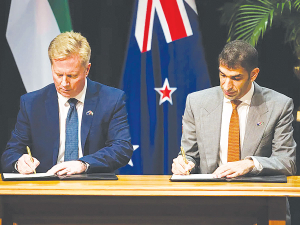Government Declares Medium-Scale Adverse Weather Event in Bay of Plenty, Gisborne/Tairāwhiti, and Canterbury
Recent weather events in the Bay of Plenty, Gisborne/Tairawhiti, and Canterbury have been declared a medium-scale adverse event.
 Trade Minister Todd McClay and his UAE counterpart the Minister of State for Foreign Trade Dr Thani bin Ahmed Al Zeyoudi in Wellington last year.
Trade Minister Todd McClay and his UAE counterpart the Minister of State for Foreign Trade Dr Thani bin Ahmed Al Zeyoudi in Wellington last year.
New Zealand’s free trade deal with the United Arab Emirates (UAE) has now been signed.
In Abu Dhabi yesterday, New Zealand Prime Minister Christopher Luxon and UAE President Sheikh Mohammad bin Zayed witnessed the signing of the Comprehensive Economic Partnership Agreement (CEPA) and an accompanying investment treaty by Trade Minister Todd McClay and his UAE counterpart the Minister of State for Foreign Trade Dr Thani bin Ahmed Al Zeyoudi.
Luxon says that securing trade deals for kiwi exporters has been a top priority for the National-led government as it aims to double the value of the country's exports over the course of a decade.
“The CEPA will unlock economic opportunities for Kiwi businesses, secure preferential access for our primary sector exporters, and strengthen supply chains with a key partner in the Gulf region,” he says.
Two-way trade between New Zealand and the UAE is currently valued at NZ$1.3 billion annually.
Meanwhile, Trade Minister Todd McClay says the deal means duties on 98.5% of New Zealand exports to the UAE will be eliminated immediately on entry into force.
That will then rise to 99% within three years, something McClay says will contribute to the government's target of doubling exports by value in ten years.
“We’re committed to working closely with the UAE to bring the CEPA into force as soon as possible, ensuring it quickly brings benefits to both sides,” he says.
New Zealand’s top exports to the UAE are dairy ($707 million), industrial products ($242 million), meat ($50 million), horticulture ($47 million), and tourism ($33 million).
The Meat Industry Association of New Zealand (MIA) today announced that Chief Executive Officer Sirma Karapeeva has resigned from the role.
The winners of the 2026 Hawke’s Bay/Wairarapa Dairy Industry Awards were announced at the annual awards dinner held at Copthorne Solway Park in Masterton on Thursday evening.
Environment Southland is welcoming this week’s decision by the Environmental Protection Authority (EPA) to approve the release of Blaptea elguetai, a leaf‑feeding beetle that will help control the highly invasive Chilean flame creeper.
This March, the potato industry is proudly celebrating International Women’s Day on 8 March alongside the International Year of the Woman Farmer, recognising the vital role women play across every part of the sector — from paddocks and packhouses to research, leadership, and innovation.
Fruit trader Seeka posted a record profit and returns to shareholders in 2025.
Recent weather events in the Bay of Plenty, Gisborne/Tairawhiti, and Canterbury have been declared a medium-scale adverse event.

OPINION: A mate of yours truly reckons rural Manawatu families are the latest to suffer under what he calls the…
OPINION: If old Winston Peters thinks building trade relations with new nations, such as India, isn't a necessary investment in…